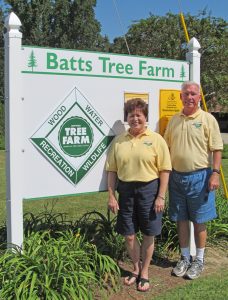
Dwight and Judy Batts grow timber on 375 acres while promoting sustainability and protecting wildlife habitat through conservation programs.
By Nimasheena Burns, Public Affairs and Outreach Specialist, North Carolina Farm Service Agency
In the small town of Macclesfield, North Carolina, Dwight and Judy Batts have made a name for themselves as nationally recognized, award-winning tree farmers. They were named the 2014 National Outstanding Tree Farmers of the Year by American Tree Farm System (ATFS) and the 2012 North Carolina Tree Farmers of the Year. With over 375 acres of ATFS certified forestland, these fifth generation tree farmers operate land that has been in their family for more than 100 years.
The Battses harvest their various tracks of trees every 5 to 7 years. The harvested trees are transported to various mills to become paper, furniture or lumber for houses.
The family legacy continues with the seventh generation that lives and works on the loblolly and longleaf pine farm. Dwight loves having his grandchildren on the farm. While their grandchildren love observing the birds, he says, “They don’t even know that they are gaining responsibility and learning about business and conservation.”
As leaders in the timber industry, they work hard to set the example not just in production, but in sustainability. In an effort to ensure that wildlife habitat is preserved and the land is passed down to future generations, the Battses are proponents of conservation.
Recently the USDA Farm Service Agency (FSA) and Natural Resources Conservation Service (NRCS) partnered with the Battses to host school children and multiple troops of local boy scouts for an Environmental Field Day. The group of more than 600 children worked on conservation projects while enjoying the surrounding wildlife.
Dwight was first introduced to the FSA Conservation Reserve Program (CRP) in 1986, only two short years after his parents began producing trees. At the time, the family had 80 acres of loblolly pine and this year the initial 80 acres of trees will meet a bittersweet end as the Battses harvest them for production.
“I’m sad to see them go because dad and mom planted them, but it is time,” Dwight said. “With pulpwood production and lumber getting better prices the risk is not as bad as it was in years past.”
CRP is a voluntary program that contracts with agricultural producers so that environmentally sensitive agricultural land is not farmed or ranched, but instead used for conservation benefits. CRP participants establish long-term, resource-conserving plant species, such as approved grasses or trees (known as “covers”) to control soil erosion, improve water quality and develop wildlife habitat. In return, FSA provides participants with rental payments and cost-share assistance. Contract duration is between 10 and 15 years.
Aside from tree production, the Battses raise and release birds annually. Around 250 bluebirds are produced each year in nest boxes. The farm has gained tourism appeal, and almost 2,000 people have visited their three tree farms to date.
As consumer demand for local products rises, U.S. farmers and ranchers like the Battses are working to meet the demand by creating local markets for their products. USDA is working hard to introduce these family farmers and ranchers to the American consumer.
Between 2009 and 2015, USDA invested over $1 billion in more than 40,000 local and regional food businesses and infrastructure projects.
For more information about local food and markets visit http://www.usda.gov/wps/portal/usda/knowyourfarmer?navid=kyf-kyf. For more information on conservation programs, visit www.fsa.usda.gov/crp.





